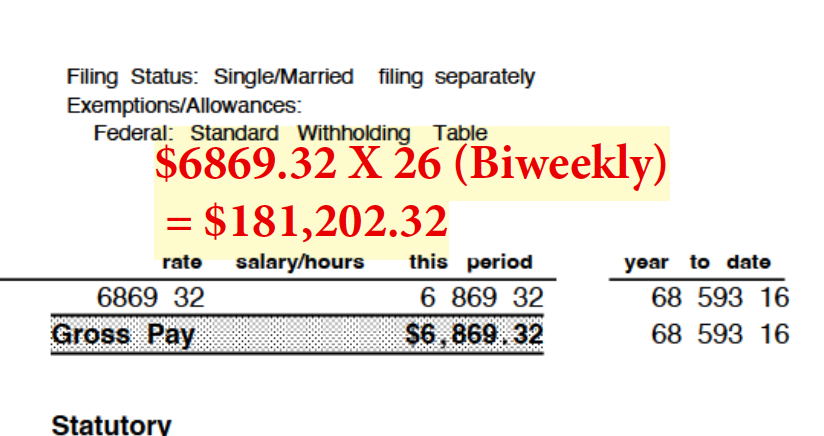[IMAGE: Paystub showing $6869.32 biweekly = $181,202.32 annual salary] Caption: This was my reality: $181K base salary ($200K+ total comp) while grinding 60+ hours a week. Looking successful on paper, feeling trapped in reality.
This is my paystub. $181,202.32 a year. Total comp over $200K with bonuses and benefits.
And I want you to stare at it until it makes you uncomfortable.
Because here’s what I realized: if you’re not making close to this kind of money, you’re not paid enough to put up with toxic managers, 60-hour weeks, and workplace bullsh*t that’s stealing your life.
I’m about to tell you exactly how I got here, why most people never will, and what you need to do if you’re tired of being underpaid and overworked. This isn’t just about money—it’s about recognizing that your pain and frustration aren’t punishments. They’re the universe screaming at you to level the f*ck up.
The $80K Trap That Almost Kept Me Small
Let me take you back to 2017. I was making $80,000 a year, working six to seven days a week, grinding my ass off. I thought I was doing well. I thought I should be grateful.
But here’s what $80K actually bought me: stress about every purchase, budgeting for basic wants, and the crushing realization that despite working harder than everyone around me, I couldn’t afford the life I actually wanted.
A house? Not happening without extreme sacrifices. Nice vacations? Maybe once a year if I planned for months. Someone to clean my house? Absolutely not. A premium gym membership? Had to think twice about that $200/month.
I didn’t come this far in life to make $80,000. And neither did you.
The breaking point wasn’t just the money—it was the toxic boss who made me feel like I should be grateful for the opportunity to be exhausted, underpaid, and undervalued.
The $112K Lie: When “Success” Still Feels Like Failure
By 2020, I’d climbed to $112,000. Finally broke six figures! I thought everything would change.
It didn’t.
You know what the difference between $80K and $112K actually feels like after taxes? Almost nothing. The government took most of that “raise,” and I was still budgeting, still stressed, still working insane hours for someone who didn’t appreciate what I brought to the table.
That’s when I realized: most people think breaking $100K means they’ve “made it.” But $100K is still broke if you can’t live the life you want.
The Tesla Moment That Changed Everything
Here’s the story that rewired my brain forever.
It was 2013, my last day working at the bank. A client walked into my office wanting to buy his father a Tesla. He asked whether he should pay cash or finance it given the low interest rates.
“Well, that depends on how much money you make,” I said.
He handed it over casually. “I don’t even know exactly what I make.”
I looked at the numbers and almost fell out of my chair.
$650,000 a year.
This man was casually deciding whether to buy a $100K car with cash or financing, while I was calculating whether I could afford a $5 coffee without affecting my budget.
Once you see a number like that, you can’t unsee it. It broke something in my brain—in the best possible way.
I realized I wasn’t even playing in the right league. Worse, I didn’t even know that league existed.
The Coach Investment That Changed My Life
Instead of staying comfortable in my frustration, I made a decision that seemed crazy at the time: I hired a career coach and resume writer.
It wasn’t cheap. But working with someone who understood positioning, value articulation, and strategic career moves took me from $112K to $170K in less than two years.
I didn’t do this alone. And neither should you.
The difference wasn’t that I suddenly became more skilled or worked harder. I was already working my ass off. The difference was learning how to position myself, articulate my value, and demand what I was actually worth.
By the time I left that organization, I was making over $170K with better benefits and—this is crucial—respect for my time and boundaries.
How to Recognize You’re Underpaid (Even If You Think You’re Doing Well)
Most people have no idea they’re underpaid because they’re comparing themselves to broke people instead of successful people. Here’s how to know if you’re underpaid:
The Lifestyle Test: Can you afford the life you want without constantly doing mental math? If you’re making “good money” but still budgeting every purchase, something’s wrong.
The Tesla Test: Could you buy a car (or any major purchase) without it being a months-long financial planning project? If not, you’re not making enough.
The Time Value Test: Calculate your actual hourly rate. Include all the hours you actually work—emails after hours, weekend tasks, the mental energy you spend thinking about work. Is that number impressive or depressing?
The Pain Test: Are you tolerating workplace bullsh*t because you feel like you can’t afford to leave? That’s not gratitude—that’s financial fear keeping you small.
The Vacation Test: Do you actually take real vacations, or do you take “budget-friendly getaways” while telling yourself you’re being responsible?
If any of these hit home, you’re not making what you’re worth. And if you’re not making what you’re worth, you’re definitely not paid enough to put up with toxic management.
Why Toxic Bosses Aren’t Worth Any Amount of Money (But Especially Not Your Current Salary)
Let’s be brutally honest: toxic bosses are everywhere. But there’s a difference between dealing with difficult people when you’re making $200K+ versus tolerating abuse for $80K.
Here’s what toxic management actually costs you:
Mental Health Tax: Stress, anxiety, and burnout aren’t just uncomfortable—they’re expensive. Therapy, medical issues, and the emotional labor of dealing with workplace toxicity add up.
Opportunity Cost: Every day you spend in survival mode is a day you’re not growing, learning, or building toward something better.
Skill Stagnation: Toxic environments don’t develop talent—they exploit it. You’re not getting better; you’re just getting more tired.
Network Damage: Bad workplaces don’t connect you to influential people. They connect you to other people stuck in bad situations.
Confidence Erosion: The longer you stay in a situation where you’re undervalued, the more you start to believe that’s what you’re worth.
Here’s the truth nobody talks about: pain from a toxic boss isn’t punishment—it’s the universe’s way of telling you to level up.
That discomfort you feel? That Sunday-night dread? That constant frustration? It’s not something to endure. It’s information. It’s your internal GPS saying, “Wrong direction.”
The Clear Signs It’s Time to Leave (Stop Making Excuses)
Stop waiting for permission to want better. If these apply to you, it’s time to make your move:
You’re making less than $150K and dealing with workplace toxicity. Life’s too short and your skills are too valuable.
You dread Monday mornings more often than you look forward to them. This isn’t normal, and it’s not sustainable.
You’re working significantly more hours than when you made less money. If your hourly rate has decreased as your salary increased, you’re moving backward.
You fantasize about quitting more than once a week. Your subconscious is trying to tell you something. Listen.
You feel trapped by “golden handcuffs” that aren’t actually golden. If you can’t afford to leave your job, you can’t afford to stay either.
Your boss takes credit for your wins but blames you for failures. Classic toxic behavior that won’t change.
You’re not learning anything new. If you can do your job on autopilot, you’re professionally dying.
Here’s a stat that should motivate you: 42% of employees who left their jobs would have stayed if their company had done something—anything—to keep them valued and engaged.
Don’t be the person waiting for someone else to recognize your worth. Recognize it yourself and demand it.
How I Repositioned Myself (The Exact Steps You Need)
My transformation from $112K to $170K+ didn’t happen by accident. It happened because I made strategic moves with professional guidance. Here’s the playbook:
Step 1: I Stopped Selling Time and Started Selling Results
Instead of listing my job duties on my resume and in interviews, I started showcasing specific, measurable outcomes. Revenue generated, costs saved, processes improved, problems solved.
Before: “Responsible for managing client relationships.” After: “Increased client retention 23% and grew portfolio value by $2.3M through strategic relationship management and proactive problem-solving”
Step 2: I Invested in Professional Positioning
Working with a career coach wasn’t just about resume writing—it was about completely reframing how I saw myself and how others saw me.
The ROI was immediate and exponential. Every dollar I spent on professional development came back multiplied.
Step 3: I Networked Strategically, Not Desperately
I stopped applying to job postings like everyone else and started building relationships with decision-makers. This isn’t about schmoozing—it’s about showcasing your expertise to people who can actually hire you.
Step 4: I Negotiated Based on Value, Not Need
I learned to articulate why I was worth the investment, backed by specific examples and market research. The conversation shifted from “please pay me more” to “here’s the ROI you get by investing in me.”
The key insight: How to make more money isn’t about working harder—it’s about positioning yourself correctly and demanding what you’re actually worth.
Stop Playing Small: Your Financial Future Depends on It
Here’s what nobody tells you about staying underpaid: it’s not just about this year’s income. It’s about the compound effect of low salaries over time.
If you’re making $80K when you should be making $150K, that’s not just a $70K difference this year. Over a decade, with regular raises and career progression, that gap could easily become $500K-$1M+ in lost lifetime earnings.
Add in the opportunity cost of working for toxic bosses who stunt your professional growth, and the real cost becomes astronomical.
Most people give up before they reach their earning potential. Not because they’re incapable, but because they can’t see how close they are to the breakthrough that changes everything.
Don’t be like most people.
The Hard Truth: You Need Help (And That’s Not Weakness)
I could give you a list of things to do, but here’s what actually happened when I tried to figure this out alone: I stayed stuck for years.
The difference between staying at $112K and jumping to $170K+ wasn’t my work ethic—I was already working my ass off. It wasn’t my skills—I was already good at what I did.
The difference was working with someone who understood positioning, negotiation, and strategic career advancement.
Your biggest limitation isn’t your resume, your experience, or even your skills. Your biggest limitation is what you think you’re worth and what you believe is possible.
If you keep doing the same things and expecting different results, that’s the definition of insanity.
Stop Wasting Years: Take Action Now
Stop wasting years under toxic bosses, getting underpaid, and pretending it’s fine.
It’s not fine. You know it’s not fine. Deep down, you’ve known for a while.
If you’re tired of playing small, if you’re ready to demand what you’re actually worth, if you want to stop trading your mental health for a paycheck that doesn’t even cover the life you want—it’s time to work with someone who’s walked this exact path.
Through my career concierge service at Eunioa, I help ambitious professionals break through income ceilings and escape toxic work environments. The same systematic approach that took me from $112K to $170K+ is what I use with every client.
Here’s what we’ll do together:
- Rewrite your professional story with ATS-optimized resumes that get interviews
- Reposition your value proposition so you command higher salaries
- Develop negotiation strategies that actually work
- Create LinkedIn profiles that attract recruiters and decision-makers
- Build your exit strategy from toxic environments
- Apply for jobs strategically while we optimize your positioning
I didn’t figure this out alone, and you don’t have to either.
Your biggest enemy isn’t your current boss or your current salary—it’s the voice in your head telling you to be grateful for less than you deserve.
Stop being grateful for scraps. Start demanding what you’re worth.
Book your free strategy call today. Let’s discuss exactly where you are, where you want to be, and the fastest path to get there. Because every day you wait is another day you’re leaving real money—and real fulfillment—on the table.
What would it mean for you and your family if you doubled your income? What legacy could you leave? What would your retirement look like? If you have kids, could you pay for their education so they graduate debt-free? What could you do for your parents if they needed support?
These aren’t just dreams. They’re decisions.
The only question is: are you ready to stop playing small?
Frequently Asked Questions
Q: How do I know if I’m really underpaid or just being greedy? A: If you’re working hard, delivering results, and still can’t afford the lifestyle you want, you’re underpaid. Research market rates for your role and experience. “Greed” is wanting something for nothing. You’re talking about fair compensation for value delivered.
Q: Should I quit my job immediately if my boss is toxic? A: Have a strategy first. Build your financial runway, update your professional materials, start networking, and work with a coach to position yourself correctly. Then make your move strategically, not emotionally.
Q: Can someone really help me increase my salary significantly? A: Absolutely. The ROI on professional career guidance is typically 5-10x within the first year. I’ve seen it repeatedly: people who invest in strategic positioning and negotiation see dramatic salary increases. The question isn’t whether it works—it’s whether you’re ready to invest in yourself.
Q: What if I don’t have the skills to earn $150K+? A: Most people making $150K+ don’t have dramatically different skills than people making $80K. They have better positioning, clearer value articulation, and stronger negotiation strategies. The skills you have are probably more valuable than you realize—you just need to learn how to communicate and price that value correctly.
Ready to stop playing small and start getting paid what you’re actually worth?
Visit eunioa.io/career to book your free strategy call.
Follow us on LinkedIn: www.linkedin.com/company/eunioa
Book a free strategy call: calendly.com/rosey-singh-eunioa/free-strategy-call
Don’t let job search isolation derail your career goals. Your next opportunity is waiting, and with the right support, you’ll find it faster than you think.






